Building Your Startup's Software Development Team: A Complete Guide
Discover how to build an efficient software development team for your startup. Our comprehensive guide outlines the key roles, team structures, best hiring practices, and strategies to manage your team effectively.
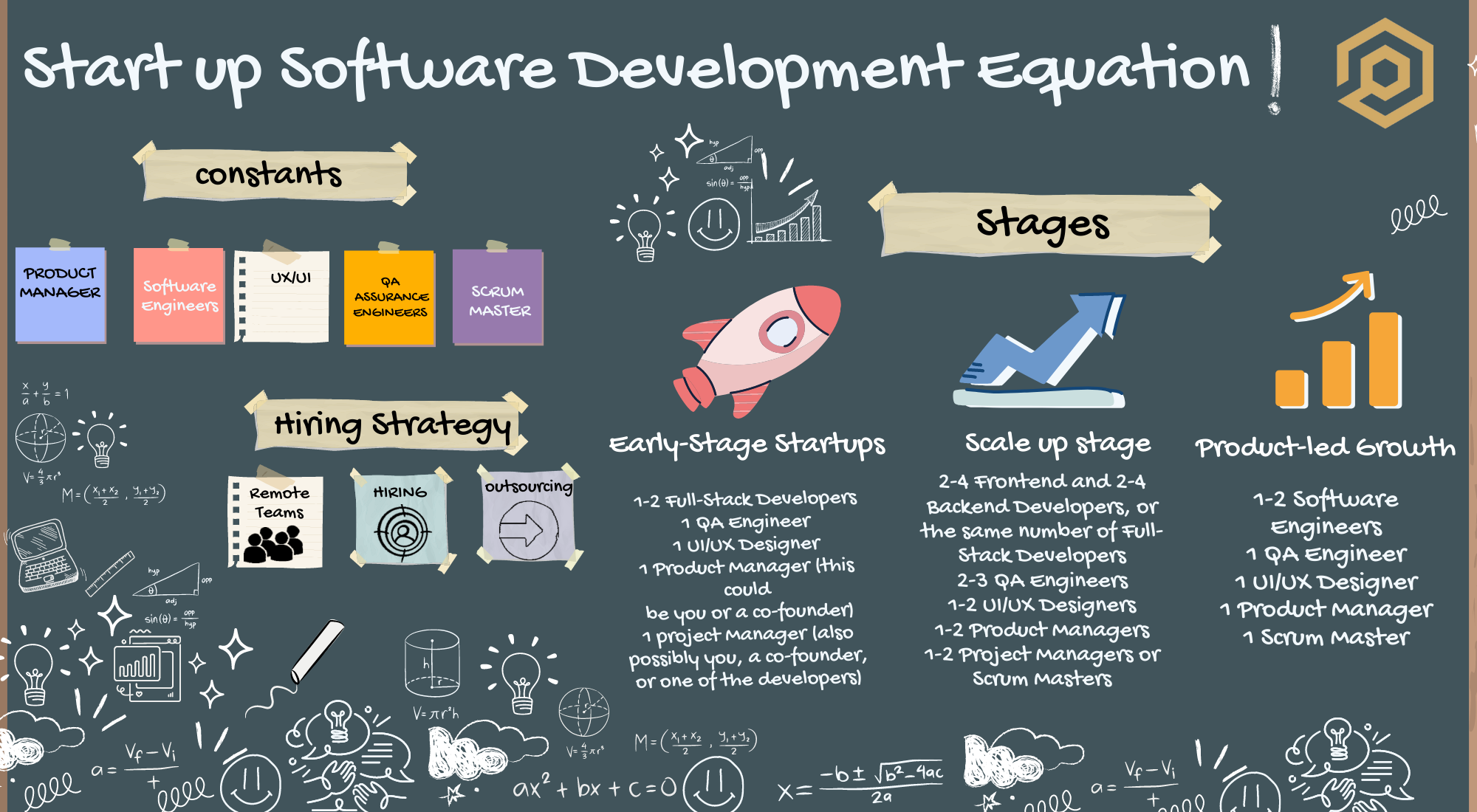
Introduction
You know, it's funny. When I started my journey in tech, beginning as a software engineer at Amazon and eventually co-founding Sych, I knew that teamwork was going to be important. What I didn't fully appreciate back then was just how crucial building a great software development team is.
This isn't just about rounding up a group of brightest coders or folks with tons of experience. It's a matter of assembling a team with the right blend of skills, nurturing an atmosphere that breathes innovation, and making everyone feel like they’re playing a vital part in the grand scheme of things. And of course, it's also about keeping up with the latest in software development and using that knowledge to your advantage.
In this piece, I'll share insights from my journey, along with practical tips, to help you build your own kick-ass software development team. Because remember, the strength of your start-up is directly proportional to the strength of your team.
Understanding Your Needs
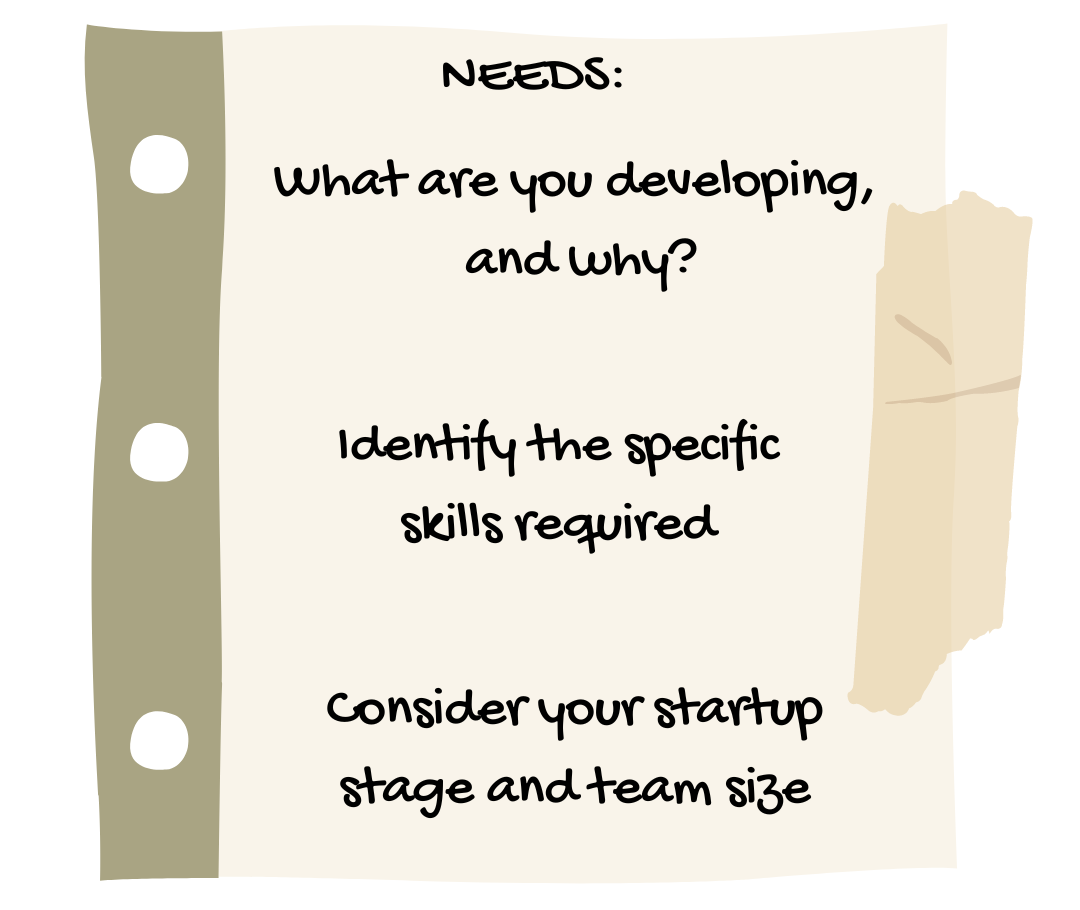
Okay, let's dive into understanding your needs. This is something I can't stress enough - knowing your tech needs before you start recruiting is super important. I know, it sounds like a no-brainer, but trust me, while starting a business, it's easier to overlook than you'd think.
Remember, your startup is unique. It's got its own vision, its own market, and its own audience. So, before you start putting together your software development team, you've gotta understand what exactly it is your building and why.
What are you developing, and why?
First up, let's talk about your product. What kind of software are you working on? A web platform, a mobile app, some cutting-edge AI? Each one has its own unique requirements. For instance, if you're building a web platform, you'll need pros who are good at both the front-end (that's the part your users interact with) and the back-end (where all the data crunching happens). But if you're diving into the world of AI, you might need a team with data scientists and machine learning experts.
Some questions to ask yourself:
- What is the core functionality that your software needs to deliver?
- Is it customer-facing or is it solving a backend operational issue?
- Will it need to process large amounts of data quickly or handle a high number of simultaneous user requests?
Identify the specific skills required
Next up, you've got to get specific about the skills you need. Say you're making a mobile app - do you need someone who knows iOS, Android, or both? If it's a web platform, what programming languages are best suited for it? You gotta think about these things.
A few questions to consider:
- What's the tech stack for your project?
- Do you need specialists in cloud services like AWS, Azure, or Google Cloud?
- Will you need someone who knows their way around database design or is proficient in machine learning algorithms?
Consider your startup stage and team size
And don't forget about the stage your startup's at - that's going to play a big role in deciding the size of your team. If you're just starting, a small, focused team might be best. But as you grow, you'll need to bring more people on board, with roles like quality assurance, UI/UX design, and project management becoming more important.
Some more questions to mull over:
- How many developers do you realistically need at your current stage?
- What's the complexity of the tasks that need to be done?
- How quickly do you need to get your product or service out there?
Figuring this stuff out can save you a lot of headaches down the line. Trust me, there's nothing worse than realizing halfway through a sprint that you're missing a key player on your team. So take a moment, get clear on your needs, and make a plan. This prep work might seem like a pain now, but it'll make the rest of your journey so much smoother.
Defining Team Structure and Roles
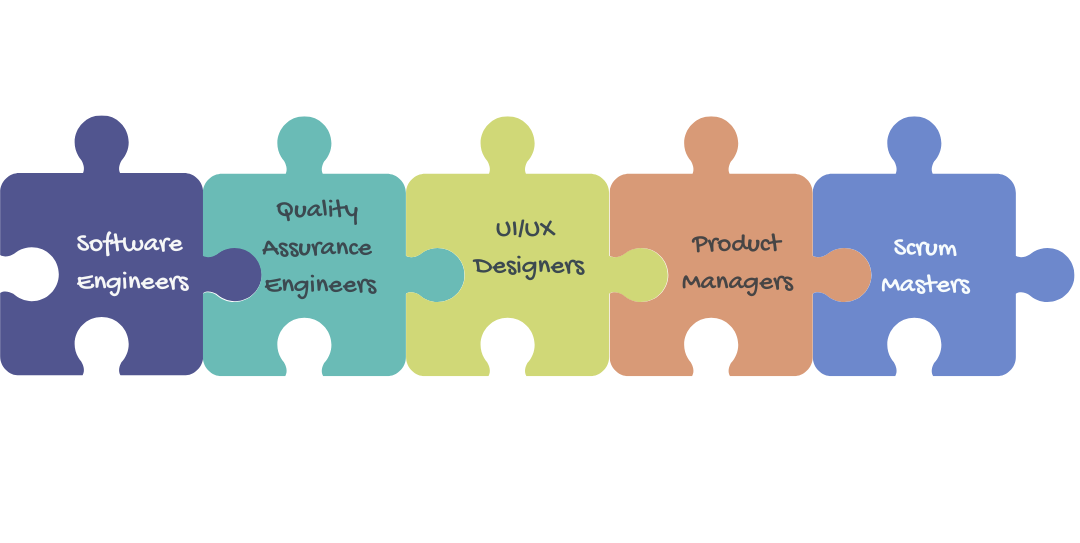
Alright, let's talk about team structure and roles. As you're pulling together your software development team, one of the first things you'll have to sort out is who does what.
Here's a quick and easy breakdown of the main roles in a typical software development team:
- Software Engineers are your builders. They’re coding and creating the tech product. Some focus on the front-end (the part your customers see), some on the back-end (where all the magic happens), and some do both - we call those full-stack engineers.
- Quality Assurance (QA) Engineers are the testers. They make sure everything works as it's supposed to and no bugs sneak into the final product.
- UI/UX Designers are the architects of the user experience. They make sure your software is not just functional, but user-friendly and aesthetically pleasing too.
- Product Managers help bridge the gap between the tech side and the business side of things. They ensure what's being built aligns with the company's vision and goals.
- Project Managers or Scrum Masters are like the team's coordinators. They keep everyone on track and ensure the project is moving forward.
Now, how many people you need for each role can vary. It depends on your startup's stage and what you're aiming to achieve:
1. Early-Stage Startups
In the early days, you might be better off with a lean, nimble team. Something like this might work well:
- 1-2 Full-Stack Developers
- 1 QA Engineer
- 1 UI/UX Designer
- 1 Product Manager (this could be you or a co-founder)
- 1 Project Manager (also possibly you, a co-founder, or one of the developers)
2. Scale-Up Stage
As your startup grows, you'll probably need to bring on more specialized roles:
- 2-4 Frontend and 2-4 Backend Developers, or the same number of Full-Stack Developers
- 2-3 QA Engineers
- 1-2 UI/UX Designers
- 1-2 Product Managers
- 1-2 Project Managers or Scrum Masters
3. Product-Led Growth
If you're focusing on product-led growth, you might find that having multiple smaller teams each working on a different feature is the way to go:
- 1-2 Software Engineers
- 1 QA Engineer
- 1 UI/UX Designer
- 1 Product Manager
- 1 Scrum Master
Remember, there's no one-size-fits-all here. It's all about figuring out what you need for your unique startup and filling those roles. And it's okay if you need to adjust as you go. That's just part of the journey!
Choosing the Right Hiring Strategy
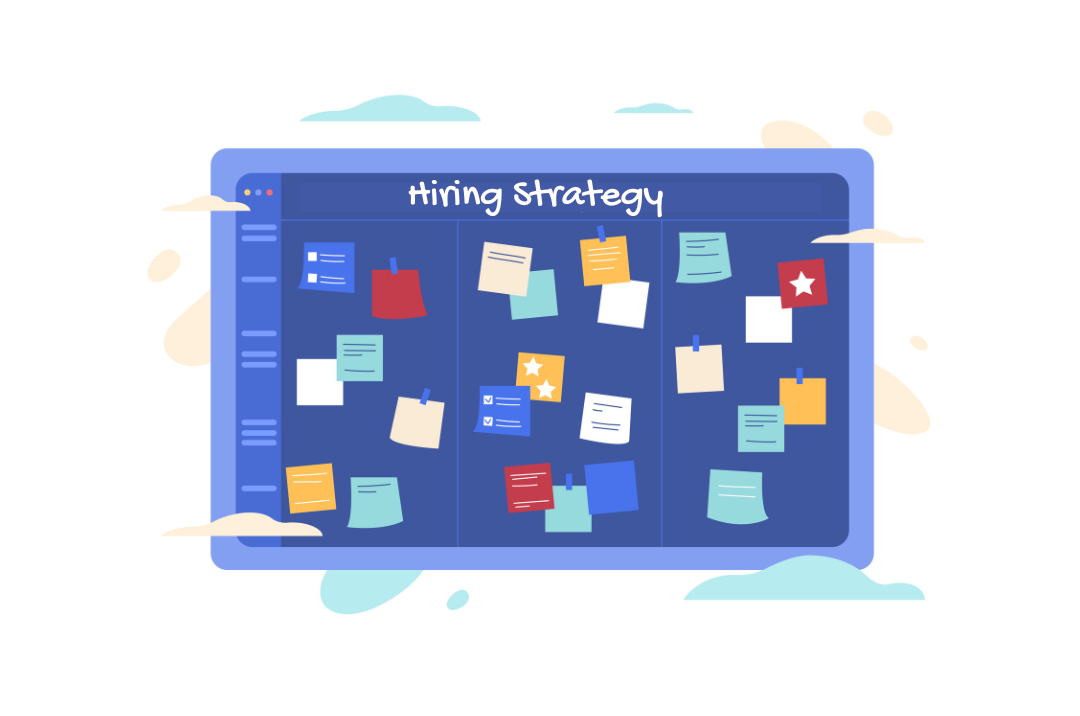
Alright, we've mapped out our needs, figured out our team structure, and now comes the big question - where do we find our people? There are three main options to consider: local hiring, remote teams, and outsourcing. All of them have their own strengths and areas to watch out for.
Local Hiring
First up, we have local hiring. It's as straightforward as it sounds - hire folks in your own backyard to work in-house. It’s easy to collaborate when everyone's under one roof, but remember, your local area may not always have the talent you need, especially if you're not based in a tech hub.
Remote Teams
Next is remote teams. This approach lets you widen your search - you can find folks from anywhere in the world. It's great if you're looking for a broader range of skills. The downside is that managing a remote team across different time zones can be a challenge. Plus, you'll need to make an extra effort to build a strong team culture when everyone's scattered across the globe.
Outsourcing
Last, but not least, there's outsourcing. Think of it as hiring a full team from a third-party company. It’s a great option if you want to bring on a skilled team quickly without dealing with things like long-term contracts, HR, payroll, and training headaches. The catch? Well, you're trusting a big chunk of your startup's work to another company, so you need to keep a keen eye on quality and make sure communication is solid.
Choosing the right hiring strategy really comes down to what's best for your startup. You need to think about your needs, the culture you're building, and your growth plans. You could potentially use a mix of all three options. Take your time, weigh up the options, and then make the decision that feels right for your startup.
The Hiring Process
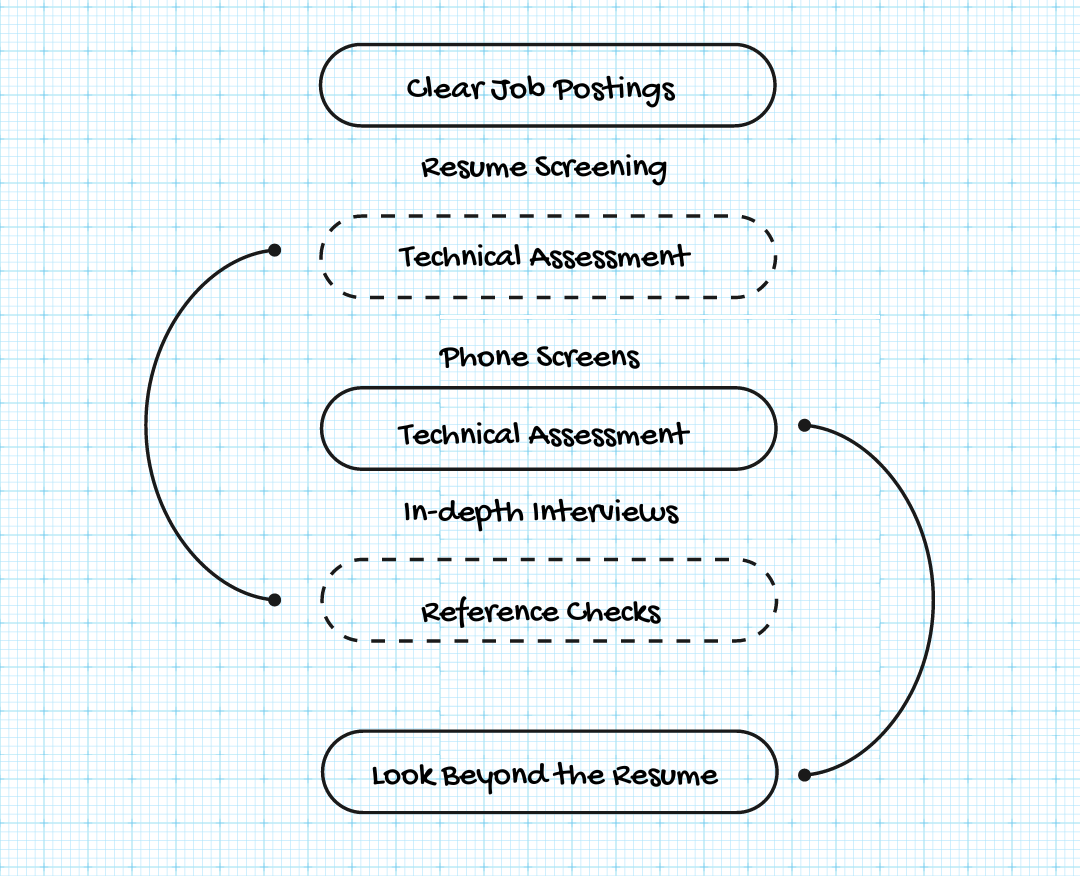
Before we jump in, I should mention that this topic is a big one, so big that we're thinking about writing a series of separate posts about it. So, if you want to be the first to know when that comes out, be sure to subscribe below:
Alright, let's dive into the real meat - the hiring process. Having been on both sides of the table, as an applicant and as an interviewer, here are a few tips and tricks:
1. Clear Job Postings
It all begins with crystal clear job postings. This helps ensure your applicants know exactly what the role entails. Tools like Workable might be helpful for managing your job postings. Or even a simple LinkedIn job posting would do if you are just starting out.
2. Resume Screening
Next up is resume screening. You're basically on a treasure hunt for candidates with the right skills and experiences. If you are flooded with resumes, parsers like Sovren can help turn that mountain of resumes into a much more manageable pile.
3. Phone Screens
With a shortlist in hand, it's time for phone screens. This initial conversation gives you a sense of their communication skills. And yeah, no fancy tools needed for this one.
4. Technical Assessment
The fourth step is the technical assessment. HackerRank or Codility are my go-to tools here. They allow you to set up coding challenges that are pertinent to the job, giving you a chance to see how the candidate tackles problems.
5. In-depth Interviews
Pass the tech test, and it's onto the in-depth interviews. I recommend a combination of technical and behavioral interviews at this stage. Zoom or Microsoft Teams serve perfectly well for these interactions.
6. Reference Checks
You're nearly at the finish line now! It's time for a background check. GoodHire or Checkr are handy tools that provide insights into your candidate's past and professional relationships.
7. Look Beyond the Resume
Lastly, and possibly most importantly, remember you're hiring a person, not a piece of paper. Traits like passion, curiosity, and resilience are invaluable, especially in a startup setting. While these traits might not always shine through on a resume, they can make a world of difference in the long run.
So this is usually my go-to approach to hiring. But it's a method that has been evolving over time, from my days at Amazon to now, at Sych.
Sustaining an Outstanding Development Team

So, you've got your dream team in place. Now, the real fun begins: managing and guiding them to work their magic on your product.
Start with Daily Stand-ups
Imagine a quick morning huddle where everyone gets on the same page. We do this every day at Sych. Each person shares what they did yesterday, what they're up to today, and any roadblocks they're hitting. For remote teams, you can do this on Zoom or Google Meet. It's a small thing, but trust me, it helps keep everyone in sync.
Plan Work in Sprints
Instead of having a never-ending to-do list, try breaking your work into sprints, just like we do at Sych. Every couple of weeks, we sit down together, decide on the tasks we're going to tackle, and then go for it. Tools like Jira can help you keep track of everything.
Do Sprint Retrospectives
After each sprint, take the time to chat about how things went. What worked? What didn't? What can we do better next time? You can use tools like Retrium for these discussions.
Keep Communication Open
Make sure everyone on your team feels comfy sharing their ideas and concerns. It's as simple as having a Slack or Teams channel where folks can chat about whatever's on their mind.
Encourage Continuous Learning
In the tech world, you snooze, you lose. Encourage your team to learn new things and stay up-to-date. We give our team access to platforms like Udemy and Pluralsight, and it's been a game-changer.
Give Regular Feedback and Recognition
Everyone loves a pat on the back, right? Regularly let your team know how they're doing and shout out the folks who are making a difference. It's a small thing, but it's a big boost to morale.
Balance is Key
Make sure your team isn't burning themselves out. Encourage breaks and sensible working hours. Tools like Clockify can help you keep a check on workloads and breaks.
Remember, these are just guidelines, and every team is different. So, don't be afraid to mix things up and figure out what works best for your team.
Scaling Your Team

Knowing when and how to scale your team can be a tricky game, believe me, I've been there. But over time, I've found a few practical strategies that make the whole process a lot less intimidating. Here's the lowdown:
Delegate, Don't Micromanage
As you scale, you have to trust your team. Yes, the stakes are higher, but you can't be everywhere at once. Empower team leads and managers to take on more responsibility. This fosters a sense of ownership and takes some load off you.
Think Beyond Job Titles
Look at the skills you need, not just job titles. You might find that the developer you're hiring could also handle project management, or your content writer might have a flair for UX design. This approach can maximize productivity and make scaling smoother.
Mentorship Programs
Introduce mentorship programs within your team. When new members join, pair them with seasoned employees. This promotes faster integration into the team and boosts morale.
Automate and Outsource
Are there tasks taking up your team's time that could be automated or outsourced? Things like data entry, scheduling, customer support - these can often be handled by automation tools or outsourced to agencies.
Always Be Hiring
Instead of waiting until you're short-staffed, be always on the lookout for talent. Having a few candidates in the pipeline can reduce the pressure when it's time to scale.
The Sych Approach
We've gone from identifying tech needs to talking about scaling teams. At Sych, we've done all this stuff so you won't have to. We've sifted through resumes, done countless interviews, and built a team of solid tech pros. So instead of worrying about assembling a team, you can focus on what really matters: growing your startup.
Picture this: no more sleepless nights over hiring or figuring out the right team dynamics. With Sych, you've got a ready-made team from the get-go. Your job? Concentrate on your startup's growth.
But, it gets better. Partnering with Sych isn't just a time-saver; it's your ticket to a global talent pool. We've got a team that's diverse in skills and experiences. So, it's not just about having software developers; it's about having a full-fledged tech team at your disposal.
And yeah, we totally understand the startup vibe. We're startup folks ourselves. We know the grind, the passion, and the bumps you encounter along the way. We're not just offering a service; we're here to join you on your startup journey.
So, if the thought of building a team from scratch makes you uneasy, remember there's another way. At Sych, we've got a top-tier software development team ready to hit the ground running. All you need to do is give us a shout. Let's start building something great together.

